No more ‘sleepy little races.’ Campaign cash fuels challengers to Boise-area school board
Will the Kuna School Board end up looking like West Bonner’s? One candidate fears it might — depending on the outcome of Tuesday’s election.
Three incumbent trustees seeking re-election each face a challenger. Joy Thomas, a two-term incumbent, said the three challengers have upped the ante in their quests to occupy the nonpartisan positions: setting up campaign websites, spreading flyers and raising thousands of dollars to support their bids.
The campaign donations reflect heightened interest in school-board races, which have often been mundane in years past.
Schools across the country have become battlegrounds over mask-wearing, LGBTQ+-themed library books and gender identity. Those issues have cropped up around the Treasure Valley, including in Kuna.
But the town of 26,673 people also has a different struggle. The district has worked to collect voluntary fees from developers that it hopes to use to offset the town’s rapid population growth and ensuing too-large classroom sizes.
The incumbent candidates have spearheaded this effort with developers. They’ve also sat through contentious School Board meetings over pandemic protocol. And they’ve worked to create school policies on hot-button topics.
“If all three of us are unsuccessful at being reelected, I fear that it won’t take long for our school district to look completely different than it does now,” Thomas told the Idaho Statesman by phone. “My biggest fear is that our district ends up looking like West Bonner.”
West Bonner became the center of a months-long statewide spectacle after its school board hired Branden Durst, a former state legislator who did not meet the qualifications legally required for a superintendent in Idaho. The board also adopted a new curriculum crafted by Hillsdale College, a conservative, Christian, private university closely aligned with the homeschooling movement and controversies over concepts like critical race theory, the Idaho Statesman reported. In August, voters responded to the changes by recalling two trustees. Durst resigned.
Let’s start with the money trail.
A combined $43,063 has been raised by all of the candidates thus far, according to the state’s campaign-finance filing portal.
Nearly two-thirds of that was raised by two challengers, one opposing Thomas. Of the three incumbents, only Thomas is soliciting campaign contributions; the other two aren’t raising any money, though one is spending some of his own. The School Board positions are unpaid, four-year terms.
Zone 1: Challenger $14,159, incumbent $7,455
Hillary Lowe, the owner of the Lowe Family Farmstead, has raised the second-most of all the candidates: $14,159, with $8,384 donated or loaned from herself. Lowe is challenging Thomas in the zone southeast of the city between Ten Mile and Five Mile roads.
Thomas said that, ahead of the candidate filing deadline, Lowe vowed to bring in at least $15,000 for her campaign.
“I went, ‘Holy cow, I’ve got to do some fundraising,’” Thomas said. So she did.
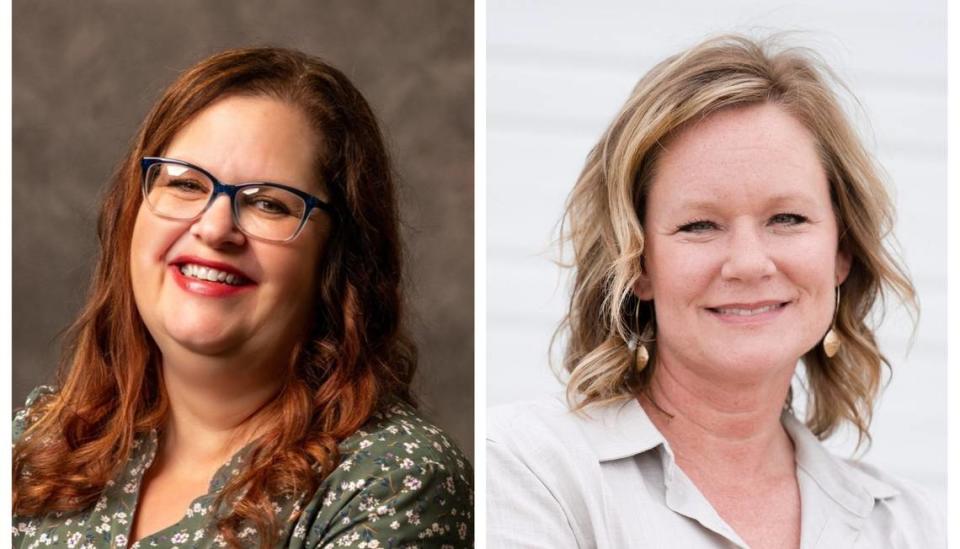
Thomas is the No. 3 fundraiser, having collected $6,470 since Aug. 1, including $1,000 from A. J. Balukoff, a businessman and former Boise School Board member; $1,000 from his wife, Susie Balukoff; and $1,000 from Rep. Ilana Rubel, a Boise Democrat who is the House minority leader. Thomas works for Rubel as the minority’s chief of staff.
The maximum individual contribution that Idaho law allows to a candidate per election cycle is $1,000.
She’s also received $250 from state Rep. Lauren Necochea, a Boise Democrat and the Idaho House assistant minority leader; $200 from Sen. Melissa Wintrow, another Boise Democrat and Senate minority leader; $100 from state Rep. Soñia Galaviz, a Boise Democrat; $100 from former state Rep. and minority caucus Chair Sally Toone, a Democrat from District 26, in south-central Idaho; and $70 from state Rep. Chris Mathias, a Boise Democrat.
An attack advertisement delivered to Kuna doors on Wednesday prominently said “Joy Thomas is funded by progressive Democrats.” The mailer listed off her campaign donors, and among them, Boise Mayor McLean. But McLean hasn’t donated a cent to Thomas.
Even so, McLean is pictured twice on the ad in a collage of some of Thomas’s actual donors.
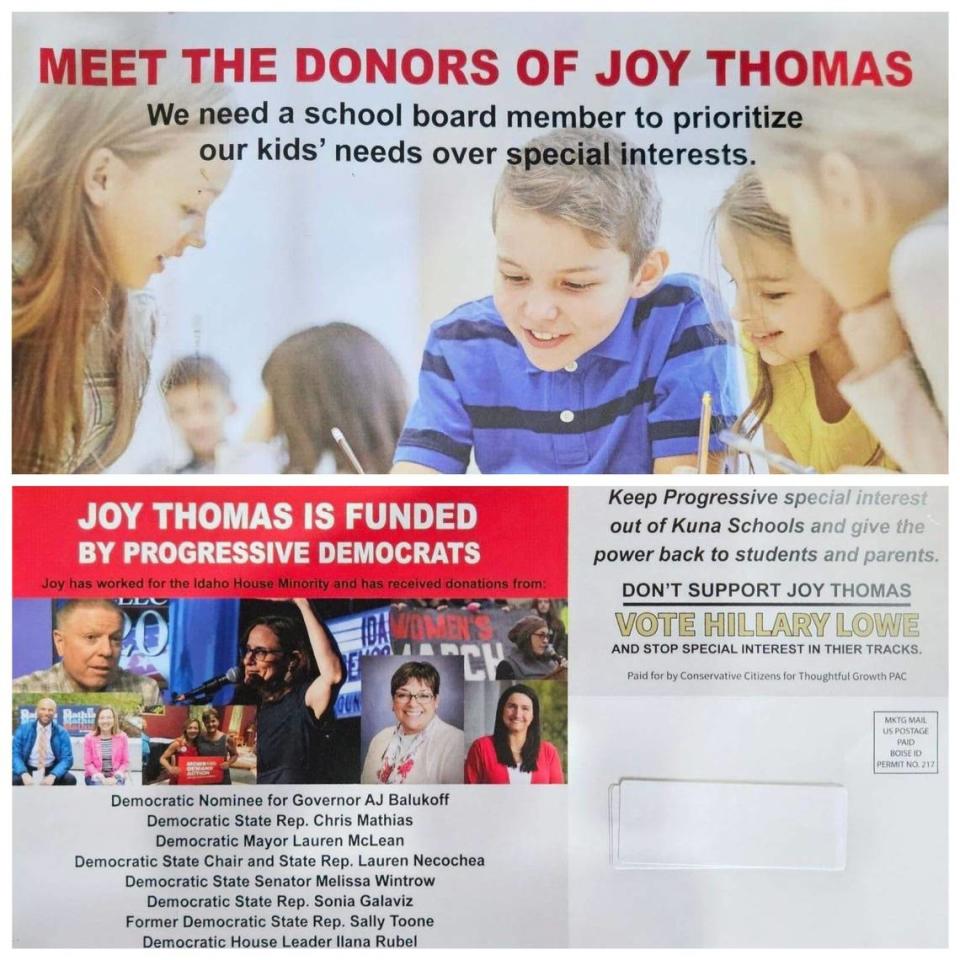
The ad, which asks voters to support Lowe instead, is paid for by a group called Conservative Citizens for Thoughtful Growth. The Boise-based PAC is headed by Tradewinds General Contracting owner Steve Martinez. It spent $2,700 on the ad against Thomas, according to an expenditures filing.
Zone 2: Challenger $15,954, incumbent $1,500
Kristi Hardy is challenging two-term incumbent and board chair James Grant in the zone that includes neighborhoods of northern Kuna. She has raised the most of all the candidates so far: $15,954, though $3,250 of that is donated or loaned from herself.
Hardy owns Cinderella Dress Rentals, a boutique on West Main Street that rents formal gowns.
For her campaign, she’s received $1,000 from Scuttles LLC, $900 from Middleton-based LLC Lansing Farms, $1,000 from Jean Taylor and $500 from Chicago Trust Company Trust.
“I’m really proud of the support I’ve gotten,” Hardy said. “I have donations from a lot of different people and I feel like that just speaks to the fact that people see what I’m doing and they see the effort I’m putting in to have good outcomes for our kids.”
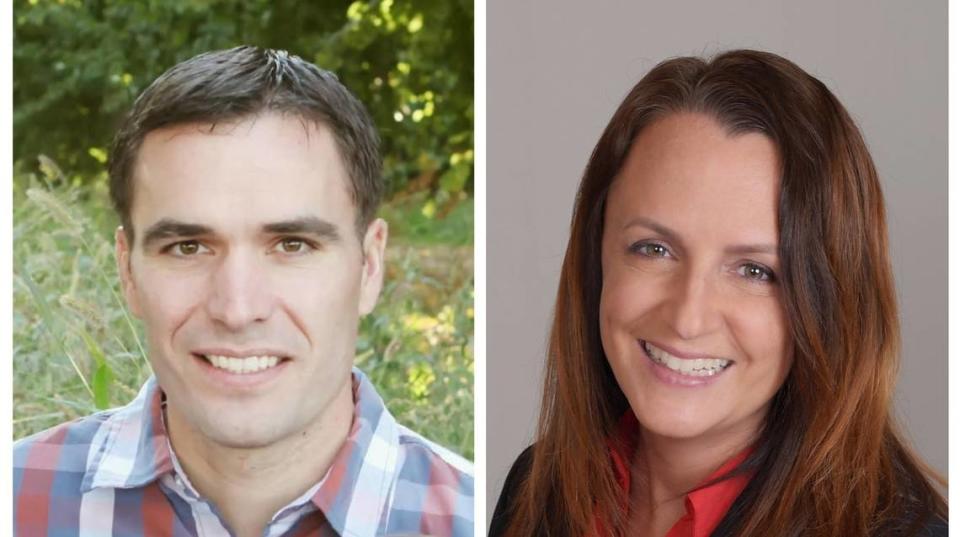
Grant told the Statesman that he won’t accept any money for his campaign and would rather people donate to the district instead, so it can make educational improvements. He hasn’t received any donations, but he did put $1,500 toward his own candidacy. Like Thomas, Grant is a two-term trustee.
“I don’t want to be bought and paid for by someone else,” he said by phone. “Any donations would be wasted on advertising for a volunteer position when that money could go towards some program for the kids instead.”
Grant, a dentist, runs a local practice called Avalon Dentistry. He also coaches football, basketball and track and field in the school district.
Zone 5: Challenger $3,995, incumbent $0
Russell Johnson, the incumbent in the zone covering the southwest area of town, faces Michael Thornton. Johnson is a partner at Johnson and Lundgreen, a law firm with offices in Boise, Meridian and Nampa. He has not received any donations for his campaign either.
Johnson ran for a seat in the Idaho Legislature in 2008 when, he said, he raised $16,000.
“But in a zone in a small school district ... I don’t even know what I’d spend $16,000 on,” he said.
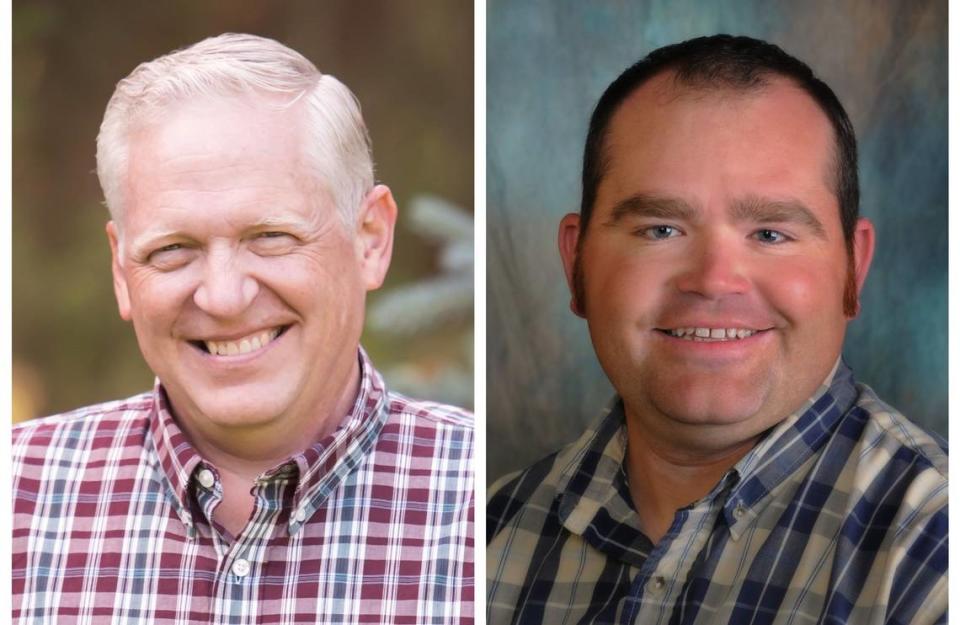
Thornton has collected $3,995 for his campaign, though $750 is from his own pocket. He also reported a $995 donation from Hardy, who initially encouraged him to run for the position, he told the Statesman.
Thornton is a farmer and works alongside his grandfather, father and brother at the family-owned Swan Falls Sod Farm.
Donors include developer, builder, family
Two partners at M3 Cos., an Idaho- and Arizona-based development company, are big donors. William Brownlee, from Peoria, Arizona, and Scott Schirmer, of Phoenix, have each given Lowe and Hardy $1,000 apiece. M3 Builders, an Arizona-based LLC with Brownlee listed as the registered agent, reported donating $5,000 in March to the Conservative Citizens for Thoughtful Growth, the group attacking Thomas.
Lowe told the Statesman that she did not know Brownlee or Schirmer personally and did not recognize their names.
“If they’re local developers, my guess would be that they’re interested in a conservative voice because they’re conservative politically, but that’s just a guess,” she said.
Hardy said she doesn’t know Brownlee either but has met with Mark Tate, the manager of M3 Cos.’ Idaho operations, to talk about education. Tate has not made any donations to the candidates in his own name.
“(Hardy) is a pillar in the Kuna community,” Tate told the Statesman by phone. “I think she’ll do a great job.”
Lowe and Hardy also received each $950 from Eagle-based G20 LLC. Amy Kelley, of Blackrock Homes, a Treasure Valley homebuilder, is listed as the company’s registered agent, according to a filing on the Idaho secretary of state’s website.
Tyler and Constance Youngkin of San Ysidro, California, have donated maximum contributions to each of the challengers as well — $1,000 apiece to Lowe, Hardy and Thornton. Quincy Youngkin, who has a Kuna address, donated $1,000 to both Lowe and Hardy.
Thornton said he didn’t know the Youngkins until they reached out to him after his declaration of candidacy. Lowe said Quincy Youngkin has lived in Kuna for years, but that she doesn’t know her personally.
“My understanding is, from what other people have told me, that she would like to see some new people on the board,” Lowe said.
Brenda Blitman, a Kuna resident, said in Kuna Must Know, a private Facebook group for local news with over 20,000 members, that the large donations gave her pause.
“It feels like a coordinated effort by outside interests to take over the school board and not a normal election year,” Blitman said. “I am worried that the challengers’ decisions may be influenced because of the campaign money that they accepted.”
The donors aren’t the only thing the three challengers have in common. They all have the same campaign treasurer, William Baber. And their campaign websites are strikingly similar in layout and color scheme.
Lowe and Thornton said they are not running as a slate, and that Baber approached them individually to offer his services. Lowe said Baber is a certified public accountant. Hardy did not respond to additional calls requesting comment.
Why developers are interested
Kuna has had a major boom in population growth over the last few years.
New developments bring new residents, which can put strain on infrastructure and services like schools, water, sewage, police and fire protection services. But unlike municipalities such as cities, counties and highway districts, school districts in Idaho aren’t allowed to charge developers impact fees for each new home or commercial building. Impact fees are one-time payments imposed on developers to help pay for the population growth their projects bring.
Thomas said overcrowding in Kuna schools has become so severe that students are “practically hanging out of doors and windows to be educated.”
To grapple with the rapid growth, the district has pushed for legislation that would let schools charge the fees, though it wasn’t able to obtain a sponsor or a hearing during the Legislature’s 2023 session.
Meanwhile, the district can, and does, ask developers to voluntarily contribute to schools in some way.
“We can’t force them to pay the schools any money,” Grant said. “But we’ve asked the mayor and City Council to let us weigh in on this.”
In February, Superintendent Wendy Johnson met with Tate, from M3 Cos., and the Idaho Building Contractors Association to discuss their concerns about the impact fee legislation. Not long after, other bills were introduced to curb the district’s efforts to seek contributions from developers. Russell Johnson said they were dubbed the “Kuna bills.”
“The bills would have substantially hampered or eliminated our efforts to obtain voluntary mitigation fees and potentially would have required refunds if such mitigation fees were paid,” Russell Johnson said. “Fortunately, those bills did not receive a hearing.”
Wendy Johnson did not respond to phone calls requesting comment.
Lowe agrees that the Legislature needs to help.
“I believe impact fees are necessary in order to measure the impact on the surrounding area when you’re developing and bringing in new homes,” she said.
One of her donors, M3 Cos., is looking to develop in Kuna. In September, Tate asked the Kuna City Council to annex a proposed 42-acre development south of Kuna Road called Rising Sun West, reported the South Valley Press, a small online news organization serving Kuna, Melba, Murphy and Marsing. Council members voted 3-1 to deny the annexation.
Some developers dislike district’s requests
Danielle Horras, director of strategic partnerships at the district, attends regular City Council and Planning and Zoning Commission meetings as new developments go through the approval process. There, she advocates on behalf of local schools and asks developers for their support. While most are “more than happy” to work with the schools — donating school buses, land or money — she told the Statesman that some developers have said what the district is asking for is illegal.
“To me, it’s a voluntary partnership,” Horras said by phone. “I explain to them that, ‘You’re selling homes in an area where there’s no capacity for those kids. There’s no space.’”
She said the district wanted the process to be fair, so it commissioned a study to determine how much each new house in Kuna was costing the district. The study came back at $3,200 per home. The district’s classrooms are at 90% capacity, according to Horras, and she worries the situation will escalate further, to 110% or 130% capacity.
“We have to do something different, and that’s what we’re trying to do,” she said.
Some developers have threatened to move their projects to another city rather than partner with the schools, she said. But Horras and the three incumbents said several developers have stepped up and pledged support for the schools.
They all noted one development company that made a noteworthy contribution to the district: Haven Idaho.
Formed in 2021, Haven Idaho agreed to donate a lot to the district in its proposed Haven Creek community along Robinson Road in Nampa. Students in the career and technical education program at Swan Fall High School in Kuna will assist with the construction of a house on the lot, and then, once the house is sold, Haven Idaho plans to donate the profits back to the district.
“I don’t want to give a false impression that all developers are the enemy, because that’s not the case at all.” Russell Johnson said. “We need to partner with them, and we need to figure out solutions.”
In the last five years, Grant said, the district has collected about $5 million from developers, mostly in land donations.
Without voluntary funding from developers, which the district calls mitigation fees, and without support from taxpayers via a levy or bond, the district isn’t able to build more space for the children each new household brings.
Bond issue fails, students keep coming
In March, the district ran a $111.4 million bond election to pay for more classrooms. Even with 58.5% of voters’ support, the measure failed. Bond issues create public debt that property owners must pay off, so Idaho requires two-thirds of voters to pass it.
If the district were to pass a bond next spring, it would still be years before students could move into the new classrooms. When the last bond passed in 2017, Thomas said the board was “very frugal and transparent” in how the money was spent.
“That was very important to everyone on our board,” Thomas said.
But the growth keeps coming.
Classroom sizes have become such an issue that Kuna Mayor Joe Stear, seeking reelection to a third term in the upcoming election, said lowering class sizes and reducing the negative impact of growth on the school district are among his top priorities.
“Legislation has gone nowhere, and so now I have suggested that the team the school district and the city created meet with a group of developers to look at solutions that won’t get either of our two entities in hot water,” Stear wrote in the Statesman’s Voter Guide.
Russell Johnson said that if developers can “help take the edge off, because we are growing so fast,” then maybe the district won’t have to bond for as much money.
The three incumbents maintain that their focus is on the district’s rapid growth, and how to grapple with it. But are there other issues impacting the contentious race for reelection?
Anti-mask protests, Pride flag controversy, library-book restrictions
Some of the hot-button social issues that have driven an elevated of interest in school boards elsewhere, like the fight over classroom curricula with gay and transgender themes, may be at play in Kuna.
Grant told the Statesman that some board meetings during that pandemic got heated over COVID-19 protocols like masking.
He said some community members protested at the district’s office in September over a teacher who hung a Pride flag in a classroom. The protesters wanted the flag taken down. Grant, who describes himself as a conservative, Christian and Republican, said they also called for the teacher to be fired. He didn’t think that was the right solution, especially when the district is working to retain the staff it has.
“Does that help us raise test scores and lower class sizes? No, it doesn’t,” Grant said.
He described a separate situation involving a student who wanted to use different pronouns than they were assigned at birth, and said there was uproar over parental involvement in the child’s decision.
His opponent, Hardy, has made parental involvement one of her top priorities. Thornton and Lowe also list parental involvement as one of their focuses in the Statesman’s Voter Guide. On Hardy’s website, where she describes herself, like Grant, as a Christian and Republican, she said the COVID-19 lockdowns highlighted the need for “proactive advocacy.”
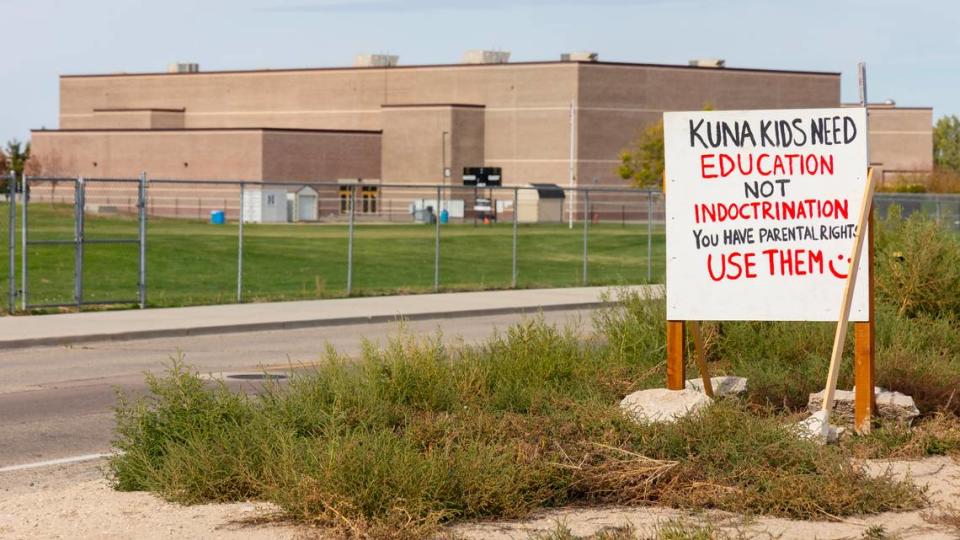
Parent-action group formed after COVID lockdown
“Leading the parent action group, Kuna School District Parents for Secondary Students Back to Full Time, demonstrated my determination to ensure our children’s education remains a priority even during uncertain times,” Hardy said on her website.
Thomas said the parents group got its start during the pandemic because its members were “anti-maskers.” Then the group took on other concerns, Thomas said, petitioning the district to change its bathroom and library policies.
In February, the district placed several books on its “behind the shelf” policy, which means students need parental permission to check them out, the Statesman previously reported. Many of the books on restricted status contain sexual content or stories about the LGBTQ community, including “Gender Queer,” by Maia Kobabe, “Rainbow Boys,” by Alex Sanchez and “This Book Is Gay,” by Juno Dawson. Johnson said the restricted books are not in general circulation.
Grant and Johnson also both said there’s a “ridiculous” myth spread by some people that the district is placing litter boxes in school bathrooms for furries. Furries are people who dress up as animal characters.
“It’s sort of an absurd extension of any serious transgender discussion,” Johnson said. “It’s somewhat of a mockery of that and a ridiculous example of what they think schools are doing.”
Hardy said she’s never filed an official complaint with the school district about anything. But she does have a supporter, she said, who has publicly protested with “signs that say something about indoctrination.”
“They donated money to me, and so that has been linked to my campaign,” Hardy said. “But I reject that. I am not responsible for what my supporters say to the public, on Kuna Must Know or to other people that work in the district.”
Lowe said she thinks the issues Kuna faces “are like every other school district in the United States that has concerns about values and curriculum.” In her answer to a question in the Statesman’s Voter Guide, she said that schools should focus primarily on traditional values in education.
Interest in school politics rises
Rubel, the legislator who backs Thomas’s re-election, said Kuna exemplifies Idahoans’ rising attention to school politics.
Rural and small-town school boards used to have “sleepy little races” when election season rolled around, she said. Not anymore.
“Our kids are the future. I suspect that, generally, there’s going to be more interest in school board races across the state,” Rubel told the Statesman by phone. “These races used to often be uncontested, but now people are waking up and getting to be a lot more concerned.”
Who’s running for Kuna School Board? Take a look at the candidates in our Voter Guide
Doorbell camera catches Kuna school board candidate replacing foe’s flyer with her own
2010 ‘injury to child’ arrest of mother on Idaho school board surfaces as election nears


